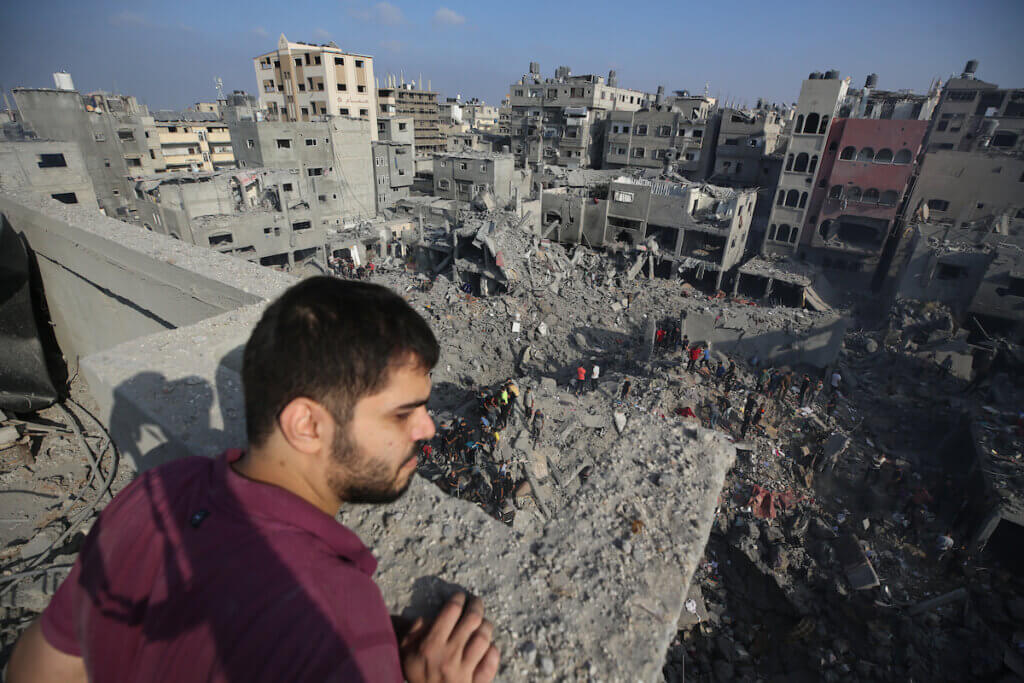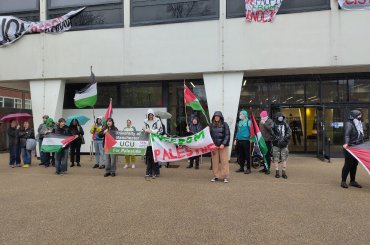The following statement was issued by Philosophy for Palestine on November 1, 2023. To add your signature, please visit philosophyforpalestine.com.
Philosophy for Palestine
November 1, 2023
We are a group of philosophy professors in North America, Latin America, and Europe writing to publicly and unequivocally express our solidarity with the Palestinian people, and to denounce the ongoing and rapidly escalating massacre being committed in Gaza by Israel and with the full financial, material, and ideological support of our own governments.
We do not claim any unique authority—moral, intellectual, or otherwise—on the basis of our being philosophers. However, our discipline has made admirable strides recently in confronting philosophy’s historically exclusionary practices and in engaging directly with pressing and urgent injustices. To this end, we call on our colleagues in philosophy to join us in overcoming complicity and silence.
As we write, bombs have killed over 8,500 people in Gaza. By the time you read this, that number will have risen. Thousands more are trapped under rubble. For over three weeks, a siege of the territory has cut off food, water, medicine, fuel, and electricity. A million inhabitants of northern Gaza have been ordered to flee their homes amid airstrikes and in advance of an ongoing ground invasion with nowhere safe to go. Talk of a second nakba is chilling, yet apt. People of conscience have an obligation to speak out against these atrocities. This is not a difficult step to take; what is far more difficult for us is to turn away in silence and complicity from an unfolding genocide.
To focus, as we do here, on the actions of the Israeli state and the unflagging support it receives from the US and its allies, is neither to blindly celebrate violence, nor to equivocate on the value of innocent lives. Civilian deaths, regardless of nationality, are tragic and unacceptable. Yet to act as though the history of violence began with Hamas’s attacks on October 7, 2023 is to display a reckless indifference to history as well as to both Palestinian and Israeli lives. In order for violence to stop, the conditions that produce violence must stop.
The blockade of Gaza has lasted 16 years; the occupation of the West Bank and Gaza has lasted 56 years; the dispossession of Palestinians of their lands and homes across historic Palestine has lasted three-quarters of a century, since the 1948 establishment of Israel as an ethno-supremacist state. It is not without reason that observers—including both international and Israeli human rights groups—now characterize Israel’s control over the land from the Jordan River to the Mediterranean Sea as a system of apartheid.
Most importantly, we are all too aware that the countries in which we live and work and to which we pay taxes is funding and abetting one party and one party only in this deeply asymmetric conflict. That party is not the oppressed, but the oppressor.
Right now, the people of Gaza have urged allies worldwide to exert pressure on their governments to demand an immediate ceasefire. But this should—this must—be the beginning and not the end of collective action for liberation. If there is to be justice and peace, the siege of Gaza must end, the blockade must end and the occupation must end. Above all, the rights all people currently living between the Jordan River and the Mediterranean, as well as those of Palestinian refugees in exile must be respected.
We invite our fellow philosophers to join us in solidarity with Palestine and the struggle against apartheid and occupation. In particular, join us in supporting the academic and cultural boycott of Israeli institutions—distinct from individuals—as outlined by the Palestinian Campaign for the Academic and Cultural Boycott of Israel (PACBI). We urge all individuals to speak out openly and fearlessly, and work to advance the cause of Palestinian liberation and justice for all.
Signed
To add your name, please visit philosophyforpalestine.com
- Sabeen Ahmed (Swarthmore College)
- Alia Al-Saji (McGill University)
- Linda Martín Alcoff (City University of New York)
- Luvell Anderson (Syracuse University)
- Louise Antony (University of Massachusetts, Amherst)
- Sara Aronowitz (University of Toronto)
- Cinzia Arruzza (New School for Social Research)
- Richard T.W. Arthur (McMaster University)
- Farshid Baghai (Villanova University)
- Étienne Balibar (Kingston University)
- Ashley Bohrer (University of Notre Dame)
- Dan Boscov-Ellen (Pratt Institute)
- Judith Butler (University of California, Berkeley)
- Taylor Carman (Barnard College, Columbia University)
- Amandine Catala (Université du Québec à Montréal)
- Lillian Cicerchia (University of Amsterdam)
- Rebecca Comay (University of Toronto)
- Elena Comay del Junco (University of Connecticut)
- Angela Y. Davis (University of California, Santa Cruz)
- Tarek R. Dika (University of Toronto)
- Zeyad El Nabolsy (York University)
- Diane Enns (Toronto Metropolitan University)
- Augie Faller (Bryn Mawr College)
- Saba Fatima (Southern Illinois University, Edwardsville)
- Ann Ferguson (University of Massachusetts, Amherst)
- Anton Ford (University of Chicago)
- Nancy Fraser (New School for Social Research)
- Alessandra Fussi (University of Pisa)
- Mercer Gary (Drexel University)
- Lauren Guilmette (Elon University)
- Lisa Guenther (Queen’s University)
- Reza Hadisi (University of Toronto)
- Rafeeq Hasan (Amherst College)
- Joshua M. Hall (University of Alabama, Birmingham)
- Raja Halwani (School of the Art Institute of Chicago)
- Naïma Hamrouni (Université du Québec à Trois-Rivières)
- John Harfouch (University of Alabama, Huntsville)
- Sally Haslanger (MIT)
- Nancy Holmstrom (Rutgers University, Newark)
- Lynne Huffer (Emory University)
- Aaron Jaffe (The Juilliard School)
- Alison Jaggar (University of Colorado, Boulder)
- Joy James (Williams College)
- Marta Jiménez (Emory University/Universidad Complutense de Madrid)
- Robert N. Johnson (University of Missouri)
- Serene Khader (City University of New York)
- Muhammad Ali Khalidi (City University of New York)
- Sarah Kizuk (Skidmore College)
- Mark Lance (Georgetown University)
- Joseph Levine (University of Massachusetts, Amherst)
- Jesús Luzardo (Loyola University Chicago)
- Nelson Maldonado-Torres (University of Connecticut)
- Margaret McLaren (Rollins College)
- José Medina (Northwestern University)
- Maria Mejia (Elon University)
- Eduardo Mendieta (Penn State University)
- Frederick Neuhouser (Barnard College, Columbia University)
- Johanna Oksala (Loyola University)
- Romy Opperman (New School for Social Research)
- Emily Parker (Towson University)
- Andrea Pitts (University of Buffalo)
- Amy Ramirez (National University of Singapore)
- Joel Michael Reynolds (Georgetown University)
- William Clare Roberts (McGill University)
- Catherine Rowett (University of East Anglia)
- Kathryn Russell (SUNY Cortland)
- Jorge Sanchez-Perez (University of Alberta)
- Lara Scaglia (Universidad Nacional Autónoma de México)
- Naomi Scheman (University of Minnesota)
- Paula Schwebel (Toronto Metropolitan University)
- Laurie Shrage (Florida International University)
- Kris F. Sealey (Penn State University)
- Hasana Sharp (McGill University)
- Falguni Sheth (Emory University)
- Sonia Sikka (University of Ottawa)
- Laura Silva (Université Laval)
- Lucian Stone (University of North Dakota)
- Olúfẹ́mi O. Táíwò (Georgetown University)
- Chloë Taylor (University of Alberta)
- Peter Thomas (Brunel University London)
- Adriel Trott (Wabash College)
- Anwar Uhuru (Wayne State University)
- Helga Varden (University of Illinois at Urbana-Champaign)
- Elizabeth Victor (William Paterson University)
- Cynthia Willett (Emory University)
- Vanessa Wills (George Washington University)
- George Yancy (Emory University)
All institutional affiliations listed for identification purposes only
To add your signature, please visit philosophyforpalestine.com or contact philosophyforpalestine [at] gmail with questions



“ We urge all individuals to speak out openly and fearlessly, and work to advance the cause of Palestinian liberation and justice for all.”
_________________________________________________
In a single secular state or a separate state? Who decides…. how and when?